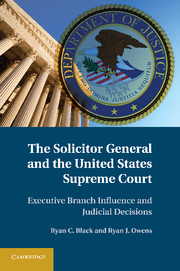 The Solicitor General and the United States Supreme Court
The Solicitor General and the United States Supreme Court Book contents
- Frontmatter
- Contents
- Acknowledgments
- 1 The Solicitor General and the Supreme Court
- 2 The Office of the Solicitor General: “The Finest Law Firm in the Nation”
- 3 Explanations for Solicitor General Success
- 4 Solicitor General Influence and Agenda Setting
- 5 Solicitor General Influence and Merits Outcomes
- 6 Solicitor General Influence and Briefs
- 7 Solicitor General Influence and Legal Doctrine
- 8 Conclusion
- Appendices
- References
- Index
5 - Solicitor General Influence and Merits Outcomes
Published online by Cambridge University Press: 05 May 2012
- Frontmatter
- Contents
- Acknowledgments
- 1 The Solicitor General and the Supreme Court
- 2 The Office of the Solicitor General: “The Finest Law Firm in the Nation”
- 3 Explanations for Solicitor General Success
- 4 Solicitor General Influence and Agenda Setting
- 5 Solicitor General Influence and Merits Outcomes
- 6 Solicitor General Influence and Briefs
- 7 Solicitor General Influence and Legal Doctrine
- 8 Conclusion
- Appendices
- References
- Index
Summary
On May 31, 2011, the Supreme Court determined that the attorney general could not be sued for damages when he allegedly misused the material witness statute to detain criminal suspects without probable cause. At issue in the case was Attorney General Ashcroft's “material arrest” warrants in the aftermath of September 11. The federal material witness statute allowed judges to authorize the arrest of individuals whose testimony was necessary in a criminal proceeding but who might flee or otherwise be absent during the trial. Ashcroft used the material witness arrest power to arrest and hold a number of individuals, including Abdullah al-Kidd, whom FBI agents arrested as he checked in for a flight to Saudi Arabia. Yet, over a fourteen-month period of jail and supervised release, Kidd was never called by the government to testify. Kidd claimed that Ashcroft simply used the material witness statute to arrest and detain him because the government had no probable cause to believe he had ever committed a crime.
The government, of course, had a different take. The Office of the Solicitor General (OSG) argued that Kidd's position was “inconsistent with repeated decisions of this Court establishing that the Fourth Amendment prescribes an objective inquiry under which an officer's subjective purpose is irrelevant.” Ashcroft's subjective intent did not matter. What mattered, said the OSG, was whether the arrest was objectively justified. The Court agreed.
- Type
- Chapter
- Information
- The Solicitor General and the United States Supreme CourtExecutive Branch Influence and Judicial Decisions, pp. 72 - 91Publisher: Cambridge University PressPrint publication year: 2012


